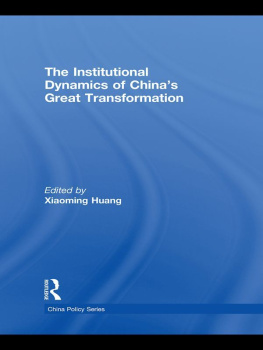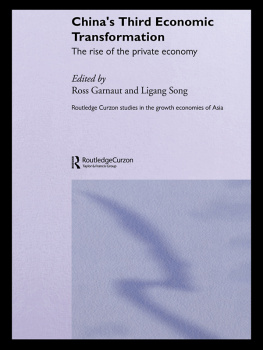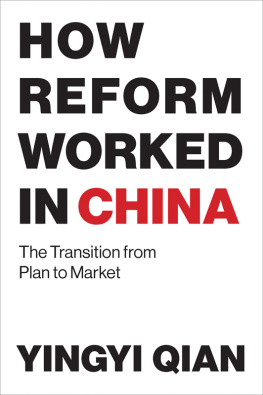
The Development of China's
Stock Market, 19842002
As China's government manages the transition away from the plan economy, how does it build the regulatory institutions that it needs to manage the new market economy? Without the right institutions in place, the remarkable growth China has witnessed over the last two decades will falter.
For any financial system, quality regulation is critical if capital is to be allocated efficiently and investors are to be properly protected. Over the last two decades, China's stock market has grown rapidly. It is already playing a crucial role in the restructuring of state-owned industry, and in the future will support a modern pension system. But are the institutions that govern share issuance and trading in China working as they should? And just how have these institutions been created?
The Development of China's Stock Market takes a close look at how politics have influenced the development of the market's institutions. It shows how public officials rather than private market players have driven, and controlled, regulatory development. In particular, the book shows how local and central government officials have competed to orient the rules of the stock market to suit their own interests, and examines in detail the problems that have resulted.
The Development of China's Stock Market is based on extensive field research in Shanghai, Shenzhen and Beijing as well as a comprehensive review of the Chinese-language literature. Issues examined in particular detail include:
the first shareholding reforms in the mid-1980s
how crises the Shenzhen riots in 1992, the treasury bond futures scandal of 1995 and the bank loan scandal of 1997 have influenced institutional development
the role of the National People's Congress in the policy process
how, after a period in which local officials enjoyed remarkable autonomy, central government gained much greater control of financial sector policy
the similarities and differences between China's regulatory institutions and those of the United States
how new policies on privatisation, pension reform and the state's debt are influencing capital market development.
The book provides the first detailed analysis of the institutional development of China's stock market. It is essential reading for all those with an interest in Asian business, financial market development and China's transition to the market.
Stephen Green is the Head of the Asia Programme at The Royal Institute of International Affairs at Chatham House, London.
RoutledgeCurzon Studies on China in Transition
Edited by David S.G. Goodman
1 The Democratisation of China
Baogang He
2 Beyond Beijing
Dali Yang
3 China's Enterprise Reform
Changing state/society relations after Mao
You Ji
4 Industrial Change in China
Economic restructuring and conflicting interests
Kate Hannan
5 The Entrepreneurial State in China
Real estate and commerce departments in reform era Tianjin
Jane Duckett
6 Tourism and Modernity in China
Tim Oakes
7 Cities in Post Mao China
Recipes for economic development in the Reform Era
Jae Ho Chung
8 China's Spatial Economic Development
Regional transformation in the lower Yangzi delta
Andrew M. Marton
9 Regional Development in China
States, globalization and inequality
Yehua Dennis Wei
10 Grassroots Charisma
Four local leaders in China
Stephan Feuchtwang and Wang Mingming
11 The Chinese Legal System
Globalization and local legal culture
Pitman B. Potter
12 Markets and Clientalism
The transformation of property rights in rural China
Chi-Jou Jay Chen
13 Negotiating Ethnicity in China
Citizenship as a response to the state
Chih-yu Shih
14 Manager Empowerment in China
Political implications of rural industrialisation in the Reform Era
Ray Yep
15 Cultural Nationalism in Contemporary China
The search for national identity under reform
Yingjie Guo
16 Elite Dualism and Leadership Selection in China
Xiaowei Zang
17 Chinese Intellectuals between Market and State
Edward Gu and Merle Goldman
18 China, Sex and Prostitution
Elaine Jeffreys
19 The Development of China's Stock Market, 19842002
Equity politics and market institutions
Stephen Green
The Development of
China's Stock Market,
19842002
Equity politics and market institutions
Stephen Green
First published 2004
by RoutledgeCurzon
11 New Fetter Lane, London EC4P 4EE
Simultaneously published in the USA and Canada
by RoutledgeCurzon
29 West 35th Street, New York, NY 10001
This edition published in the Taylor & Francis e-Library, 2004.
RoutledgeCurzon is an imprint of the Taylor & Francis Group
2004 Stephen Green
All rights reserved. No part of this book may be reprinted or reproduced or utilised in any form or by any electronic, mechanical, or other means, now known or hereafter invented, including photocopying and recording, or in any information storage or retrieval system, without permission in writing from the publishers.
British Library Cataloguing in Publication Data
A catalogue record for this book is available from the British Library
Library of Congress Cataloging in Publication Data
A catalog record for this book has been requested
ISBN 0-203-35720-5 Master e-book ISBN
ISBN 0-203-38745-7 (Adobe eReader Format)
ISBN 0415324661 (Print Edition)
Contents
PART I
Explaining institutional change
PART II
Local institutional capture
PART III
Central institutional capture
PART IV
Conclusions
Illustrations
Figures
Tables
Acknowledgements
I first thought about studying China's stock market while living in Mechanhelas, a small rural town in northern Mozambique in 1996. In the daytime, I organised food distributions for refugees coming home from Malawi after Mozambique's civil war, and in the evenings I escaped the day's stress by soaking up books such as China Wakes by Nicholas Kristoff and Sheryl Wudunn (Nicholas Brealey, London, 1994) and Burying Mao by Richard Baum (Princeton University Press, Princeton, 1994). Between them they got me hooked on reform China, its economic dynamism, Byzantine politics, and the potential that Napoleon apparently foresaw for the world to shake as a result of the revolutionary changes taking place there. China's stock market seemed to be the perfect embodiment of these things, and the instinct to write about it, as I studied Mandarin in Taiwan, and my Master's and Ph.D. in England and Mainland China, stuck.
I am glad it did. I have been immensely privileged in the course of the research to meet many of the remarkable people involved in its creation and development. Their experience and expertise have shaped my understanding of the development of the market, its institutions and its problems. My hope is that this book, based on my Ph.D. dissertation at the Department of Government at the London School of Economics and Political Science (LSE), reflects both the positive and negative aspects of development so far. It is an extremely fast-moving sector many policies have evolved since my Ph.D. was completed in May 2002 and I have done my best to ensure that this book reflects things that have happened since. Fortunately, most of the developments support the argument about the likely shifts in policy and future development trends outlined in the concluding chapter.













